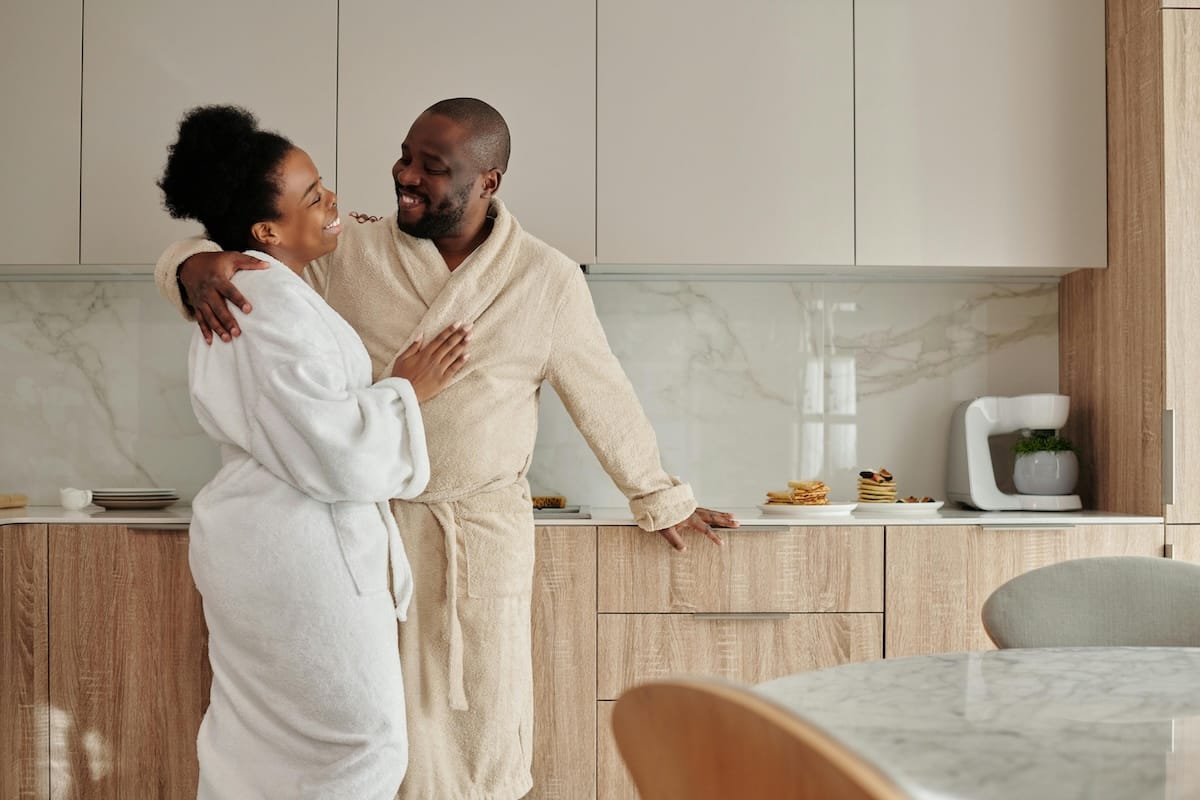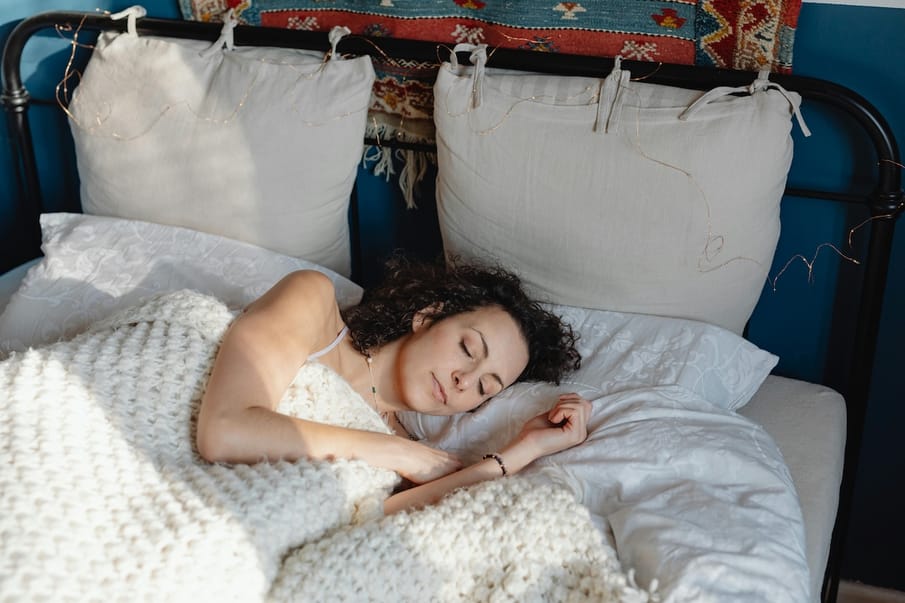We’re putting the rumours to bed as we explore the truth behind the rising trend of sleeping separately from your partner, and ask whether this night-time absence could really make the heart grow fonder?
Sleep: we all need it, yet the quantity and quality we manage to fit into our schedules can vary greatly. According to the Morbidity and Mortality Weekly Report, more than one-third of adults sleep less than the recommended seven hours each night, while the Sleep Foundation suggests that nearly half of working adults regularly feel tired during the day.
And the reasons for struggling to get enough quality rest can differ from person to person. Estimates suggest as many as 50 to 70 million people have ongoing sleep disorders, such as insomnia, sleep apnea, and narcolepsy, with 39–47% of perimenopausal women reportedly experiencing them, and 35–60% of post-menopausal women, according to data from the National Institutes of Health. Additionally, those with chronic illnesses or disabilities may find their energy levels, and need for rest, can change drastically from day to day.
When it comes to addressing this issue, we’ve all heard the basics on how to get a better night’s sleep – from drinking less caffeine to avoiding blue light before bed, and creating a relaxing nightly routine. But what if there was a bigger change we haven’t considered, that could improve both our quality of sleep and even our romantic relationships? According to some experts, sleeping solo could be the answer.
What is sleep divorce?
A new term used to describe couples that choose to sleep in separate beds rather than together, sleep divorce is more common than you might think. According to The Better Sleep Council, more than three in five (63%) couples spend most of the night sleeping separately, with one in four (26%) reporting that they sleep better alone. Of those that do share a bed, one in five (20%) end up “cling[ing] to their respective corners”.
With so many of us choosing to sleep alone instead of with our partners, why aren’t we talking about it more – and what’s stopping us from snuggling up together?
Why do some people sleep separately?
The Better Sleep Council suggests that women in particular may be more sensitive to their partner’s sleeping habits. It reports that 44% of women are kept up by their partner’s tossing and turning, 42% by their snoring, and a whopping 60% by their sleep environment. With an overwhelming 85% of us having problems sleeping at night, it’s no wonder many of us are willing to try anything to get a better night’s rest.
While people choose to sleep separately for a wide variety of reasons, some of the more common ones include:
- Different sleep patterns or schedules
- Incompatible sleep habits (loud snoring, contrasting temperature preferences, different needs for background noise, frequent bathroom trips, late-night scrolling)
- Sleep conditions (insomnia, restless leg syndrome)
- Personal preferences
- Wanting space or time to themselves
While the term ‘sleep divorce’ sounds serious, and even scary, many feel that having the space to sleep apart can help strengthen their relationship, by making the time that they do spend together that much more meaningful.
Yes! While every couple is different, sleeping separately isn’t always a sign something is wrong. For many, sleeping solo can help them to feel more rested, reduce bedtime-related arguments, avoid disturbed sleep cycles, and even create a pocket of alone time to enjoy before falling asleep. What’s important is to still create opportunities for quality one-on-one time together, foster your sense of connection, and ensure you are both happy with your sleeping arrangements.
What are the benefits of sleeping separately?
Sleep plays a vital role in our overall mental health and wellbeing, including our ability to handle stress, with good quality sleep even having a positive impact on mental health conditions such as depression and anxiety. The better we sleep, the better we can communicate with others, look after ourselves, and handle the expected (and unexpected) day-to-day stressors in our lives. The less we sleep, the more likely we are to be grumpy or easily agitated, to make poor decisions, and even to struggle to empathise with others.
Sleeping alone gives you the chance to optimise your sleep schedule and surroundings. You can make changes to your bedroom to fit your needs – whether that means sleeping with the window open in the middle of the winter, or wrapping up warm with a thick winter duvet during the summer months. You might want ambient background noise as you drift off, or a sunrise alarm clock to wake you up. Essentially, you’re in charge.
Are there any downsides to sleeping apart?
While choosing the sleep divorce route can be beneficial for many individuals and couples, it can also have its drawbacks. For some people, this can include:
- Making them feel more lonely
- Increasing feelings of insecurity
- Fostering a sense of resentment
- Reducing their sense of intimacy
For some, physically sleeping apart can create an underlying sense of disconnect, or may negatively impact your sex life, therefore it’s important to ensure you are still prioritising physical and emotional intimacy outside of the bedroom. Make time for cuddling and touching (whether sexual or not), as well as time to open up with each other and talk about your day.

Communication really is key; it’s vital to ensure each partner is able to express their needs, and feels heard, to ensure there are no misunderstandings about why you’re exploring this new sleep scenario, and how you both feel about it. Regularly checking in to make sure you are still both on board with the situation can also help avoid accidental communication breakdowns.
Depending on your living situation, having the space to sleep apart can be tricky. Not everyone has a spare room – or a good spare bed. If you aren’t able to sleep in separate rooms, but feel like your current sleeping arrangements aren’t working, having an open, honest conversation together can still help. See if there are any areas in which you can compromise, or changes to help you both get a better night’s sleep while sharing the same space.
Is sleep divorce right for me?
Having the conversation can be scary. How do you even broach the subject? If either you or your partner have been complaining about a lack of sleep, feeling exhausted, or have started to seem more irritable due to poor quality sleep, it could be a sign that it’s time to have a chat.
Talk about all things sleep-related – not just sleeping separately! Maybe one of you needs total silence to fall asleep, while the other needs background noise to drift off – it’s hard to understand which areas are and aren’t working for you, unless you create the opportunity to discuss them and make changes together.
It’s important to remember that anything you try out doesn’t have to be permanent. You might trial sleeping apart for a night or two, before having another conversation to see if you are feeling more rested – or if any new issues have popped up. This can help to avoid any resentment building, and enable you to both get a better night’s sleep without creating additional worries.
Sleeping separately doesn’t have to be an every night occurrence, either! Scheduling in weekend sleep-ins together can be one way to ensure the spark remains in the bedroom, while still prioritising quality sleep on weekdays.
So, if you or your partner is struggling for shut-eye, consider whether some time sleeping apart could actually bring you closer together.


Comments